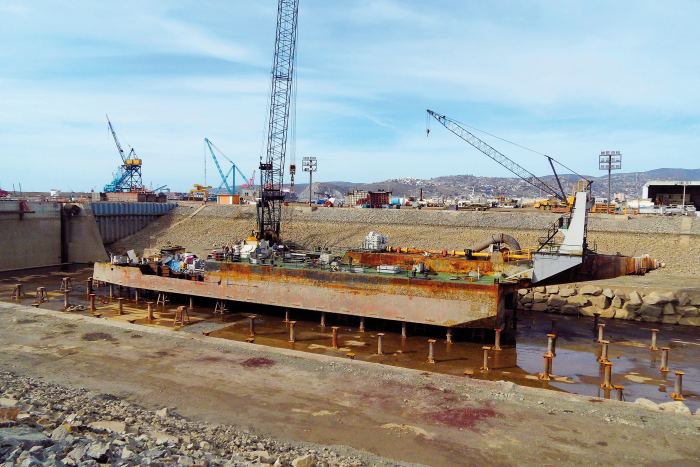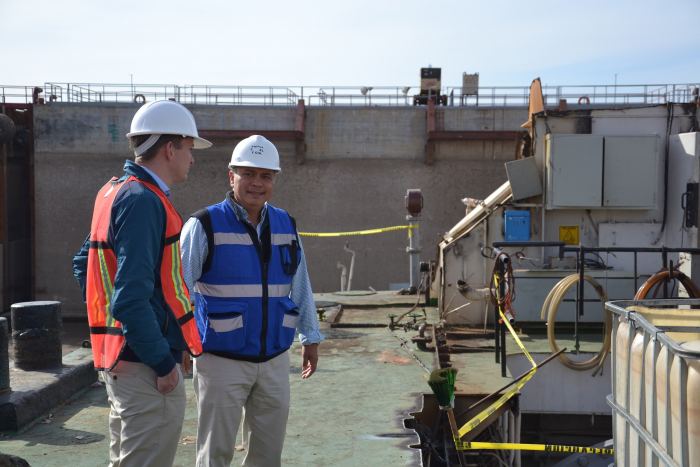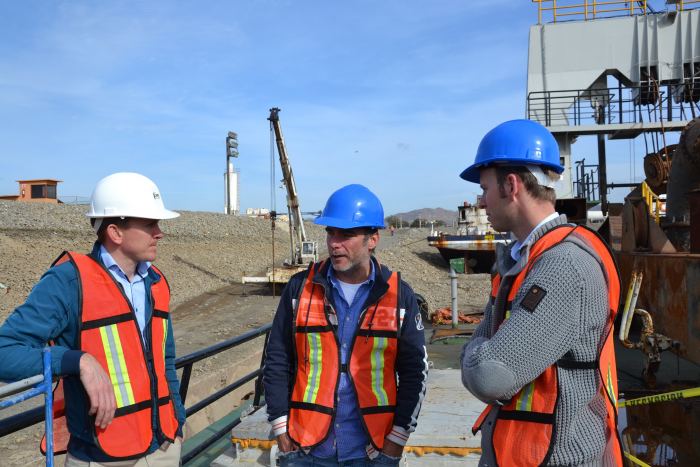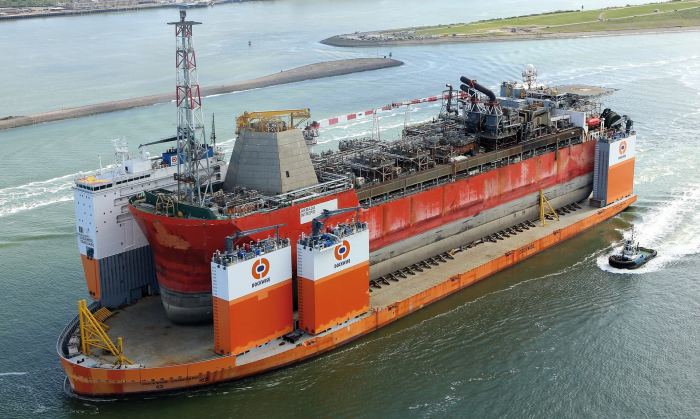The Boskalis ship dismantling policy, with ‘off the beach’ -dismantling as a prerequisite, goes beyond compliance with existing legislation and regulations. In its effort to promote safe and sustainable ship dismantling, Boskalis works with local shipyards and leading environmental organizations such as the NGO Shipbreaking Platform. The dismantling of three vessels in Mexico was recognized by the NGO as a best practice.
Roberto Curiel, the owner of the local Mexican yard, Fleet Managers Alberto Prado and Arjan Schrijen, Senior Technical Superintendent Dennis van Meerwyk from Boskalis and executives from the NGO Shipbreaking Platform, talk about this successful dismantling operation at the ISP/Amaya Curiel yard in Ensenada.
What is Boskalis’ policy regarding ship dismantling?
Arjan: “As one of the largest ship-owners in the Netherlands, we are against dismantling ships in ways that are unsafe or environmentally damaging. In places including India and Bangladesh, ships are still broken up on the beach, without adequate arrangements for the collection of fuel and chemicals, without materials being recycled and, above all, with no regard for the safety of the local workers. Their lives are on the line. Given our NINA safety program, Boskalis pays close attention to safety, and we think a dirty and dangerous practice of this kind is unacceptable. That is why we have committed ourselves to dismantling our vessels off the beach as safely and as sustainably as possible.”
We were open to new challenges and we were prepared to make improvements.
“For dismantling, we select yards that comply with the Boskalis criteria, the international environmental regulations, and with consideration of legislation and regulations that are still in the pipeline. Because the Boskalis ship dismantling policy goes beyond compliance with existing legislation and regulations, the NGO Shipbreaking Platform has recognized Boskalis as a leader in the industry.”

Dismantling of cutter suction dredger Amstel
How do you go about selecting a suitable dismantling yard?
Alberto: “Given its global activities, Boskalis scours the world for suitable shipbreaking facilities. It isn’t always practical or financially viable to bring all our old ships back to certified yards in Europe for dismantling. Nor is that always the right option in environmental terms. Apart from being very expensive, moving non-self-propelled vessels from the western coast of Mexico to Europe generates such high levels of carbon emissions that it is simply an unacceptable alternative.”
What was the decisive factor for Boskalis in considering the yard for the three cutter suction dredgers?
Alberto: “Boskalis went looking for a yard that could manage the dismantling of the three cutter suction dredgers (CSDs) on the western coast of Mexico. It soon became clear that there were no suitable yards on the Pacific coast for shipbreaking that meet the Boskalis standards and the Hong Kong Convention, which is likely to be ratified in the foreseeable future. Boskalis got in touch with the NGO Shipbreaking Platform to discuss the dilemma. The NGO Shipbreaking Platform is a global coalition of environmental, human rights and labor rights organizations working to promote safe and clean ship recycling worldwide. After those discussions, it was decided to look for a yard with the potential to make the changes required to comply with our standards. A number of possible candidates were selected and, in the end, the nod was given to the ISP/Amaya Curiel yard in Ensenada on the Baja peninsula.”

Merijn Hougee, Board Member of NGO Shipbreaking Platform and Roberto Curiel, owner of the local Mexican yard
Roberto, as owner of ISP/Amaya Curiel, why do you think your yard was chosen?
“Our yard had only been in existence for two years when Boskalis turned up and asked what we could deliver. We were open to new challenges and we were prepared to make improvements. The first requirement from Boskalis was that the yard had to have a large hard surface to comply with their off the beach dismantling policy. We already had that in the form of a concrete dry dock for repairs. The second requirement was that we had to allow Boskalis experts to supervise the dismantling.”
The Germanischer Lloyd classification society was asked to conduct an independent audit of the dismantling of the CSDs Para and Mercurius at the yard in 2014. On the basis of the experience with these vessels the procedures for the dismantling of the third CSD Amstel were further improved.
Roberto: “We were used to working with certification from local authorities but the Boskalis requirements were a lot stricter! Therefore, we called in scientists from the Marine Science Department of the University of Baja California to monitor the quality of the air, water and ground and to check the processing of hazardous substances.”

Merijn Hougee, Board Member of NGO Shipbreaking Platform, Dennis van Meerwyk, Senior Technical Superintendent at Boskalis and Arjan Schrijen, Fleet Manager at Boskalis
Dennis, as the Boskalis Senior Technical Superintendent what was your involvement in this dismantling project?
“The sustainable decommissioning of a ship requires careful preparations. Nobody knows our equipment better than we do, and sharing that knowledge contributes to successful dismantling. It is standard policy for us to draw up an inventory of hazardous substances for all vessels. During the dismantling of the Amstel, we also decided to remove the hazardous substances ourselves and to clean up all the oil and fuel tanks before the ship was towed to Ensenada. We removed parts that could be recycled elsewhere in our fleet. And once the ship was in the dock, two of our technical inspectors checked the work and suggested improvements to the process and all the underlying procedures.”
Roberto, this project was not always easy but ultimately, do you think it helped the development of your yard?
“Change always encounters opposition. The Boskalis engineers supervising the work were dedicated and they devoted a great deal of attention to compliance with international principles. In the beginning, there were some conflicts with our yard staff but the people from Boskalis were willing to talk, and happy to explain why certain procedures were necessary. Thanks to those constructive discussions and the collaboration with Boskalis, we have become more environmentally aware. We have gained experience in working in more responsible ways. The entire planet is adopting a more careful approach to the environment and I expect that our industry will become much more aware of this as well. The people from Boskalis gave us the chance to improve our operations by sharing their knowledge and by showing how things are done in the rest of the world.”
We were used to working with certification from local authorities but the Boskalis requirements were a lot stricter!
During the dismantling of the Amstel in December 2014, the NGO Shipbreaking Platform visited the yard. What is the opinion of the NGO of the Boskalis approach?
Merijn Hougee, a member of the board of the NGO Shipbreaking Platform: “The approach to this shipbreaking operation shows that Boskalis considers compliance with the international conventions for recycling to be very important. The Boskalis inspectors did everything they could to ensure that the materials from the ships were recycled cleanly and safely, and they transformed abstract principles into practical applications. Unsafe and irresponsible shipbreaking is a global problem. That is why it is so important that Boskalis has invested a great deal of time in this process and is prepared to share the expertise the company has acquired as well. That may also encourage other yards to opt for sustainable dismantling. Setting a good example for the maritime industry will, hopefully, help the traditionally dirty shipbreakers to put their house in order and establish a positive image for their industry.”
Patrizia Heidegger, Executive Director of the NGO Shipbreaking Platform: “Boskalis has demonstrated how the ship owner can improve shipbreaking operations by taking control of the process. Other ship-owners should be following their example. We look forward to extending our collaboration with Boskalis.”
